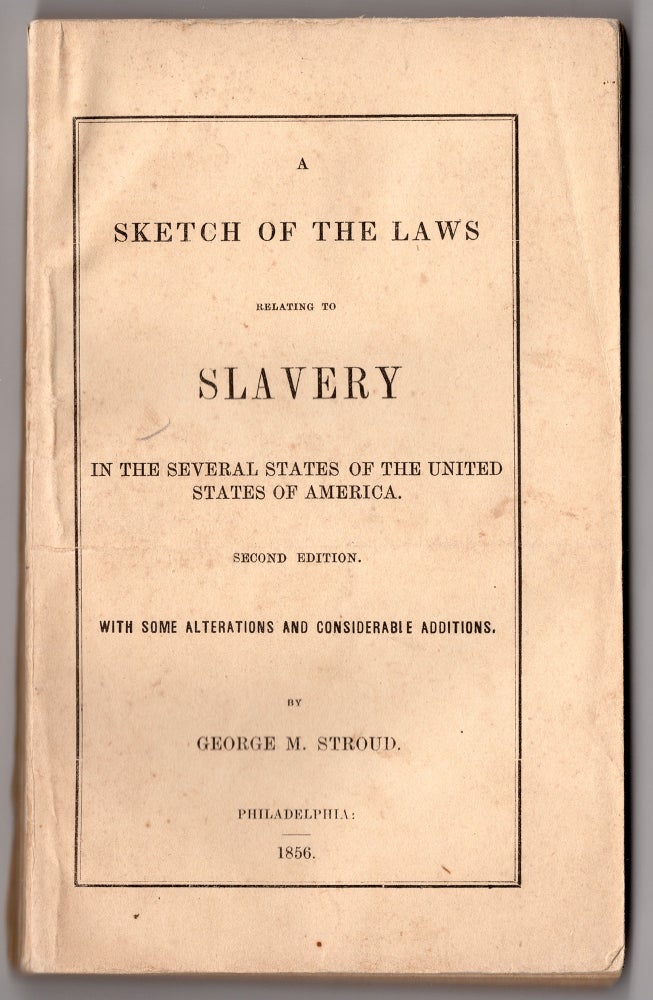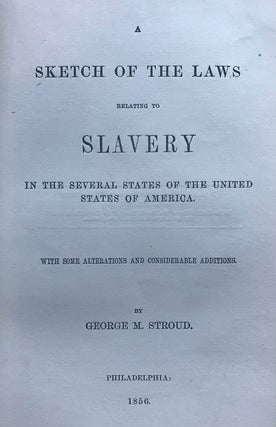A Sketch of the Laws Relating to Slavery in the Several States of the United States of America. Second Edition, With Some Alterations and Considerable Additions.
Philadelphia: Henry Longstreth, No. 347 Market St., 1856. 12mo (7.4” x 4.4”), original tan printed wrappers. xii, 125 pp. Ad on back-wrapper for the Complete Work from which the extracts contained in this pamphlet are taken. CONDITION: Good, spine partially cocked, creasing and light wear to wrappers; contents generally bright and clean, a few occasional spots of staining, an attractive example. Abridged pamphlet version of the second edition of Judge Stroud’s groundbreaking work surveying the slave codes of the period in all twelve slave-holding states and reviewing Constitutional provisions bearing on slavery. First published in 1827, this work greatly influenced national thinking on the issue of slavery by using slave law as credible data regarding the true nature of slavery. George McDowell Stroud (1795–1875) updated this work to reflect the shift in Southern thinking, which at this time regarded slavery as a positive good rather than a necessary evil. Issued at the height of the Kansas-Nebraska controversy, the work includes new material on slavery in the Territories, the 1850 Fugitive Slave Law, and slavery’s interference with the First Amendment. In his survey of slave codes, Stroud analyzes the statutes of the twelve slaveholding states—Delaware, Maryland, Virginia, North Carolina, South Carolina, Georgia, Kentucky, Tennessee, Louisiana, Mississippi, Alabama, and Missouri—and draws on works written by judges in many of those states. The work’s contents are as follows: 1) Of the Persons who may be held as Slaves, and upon what Authority they are so held; 2) Of the Incidents of Slavery—the Relation of Master and Slave; 3) Of the Condition of the Slave considered as a member of Civil Society; 4) On the Laws regulating the Emancipation of Slaves; 5) Encroachments induced by Slavery on Freedom of Speech and the Press; Appendix: Of the Laws of the U.S. relating to Slavery; 1) On the Apportionment of Representatives to Congress, &c; 2) Of the Acts of Congress relative to Fugitive Slaves; 3) Of the Jurisdiction of the Federal Government over the territories not yet formed into States; and a note on a criticism of Professor Bledsoe. Containing detailed judicial opinions on the many legal issues regarding slavery that emerged in antebellum America’s courts, Stroud’s work was widely circulated and was also published in German for German-American readership. The book exposes the draconian nature of laws throughout the South that degraded not only people of African descent but also those who held them in bondage. The influence of Stroud’s work is even found in more recent studies, such as Saidiya Hartman’s pathbreaking Scenes of Subjection: Terror, Slavery, and Self-Making in Nineteenth-Century America (1997):
Since the subjection of the slave to all whites defined his condition in civil society, effectively this made the enslaved an object of property to be potentially used and abused by all whites; however, to speak at all of the civil condition of the slave, as George M. Stroud remarked, is a kind of solecism [i.e., a grammatical mistake]. It is a tricky matter to detail the civil existence of a subject who is socially dead and legally recognized as human only to the degree that he is criminally culpable (p. 24). George McDowell Stroud was a Philadelphia lawyer who served as a judge on the District Court of Philadelphia. A graduate of Princeton and a contributor to various legal magazines, he also authored A digest of the laws of Pennsylvania (Philadelphia: M’Carty & Davis, 1837), and Southern slavery and the Christian religion (Philadelphia, 1863). “[Published before] the Dred Scott decision, Stroud’s book had extensive influence upon national legal thinking on the issue of slavery. For example, it is believed by some scholars that Harriet Beecher Stowe gained her knowledge of slave laws from Stroud’s work” (Johnson, Stroud’s Slave Laws, vi).
“This work, the first substantial legal treatise on American slavery, is considered by many the best of the antebellum studies” (Cohen 9877). A seminal examination of the laws of states where slavery was legal in 1856, here abridged to what must have been considered its most essential form. REFERENCES: Sabin 93098; Dumond, p. 106; Afro-Americana, 9948;
Cohen, Morris, L. Bibliography of Early American Law, 6 Vols. (Buffalo, NY: William S. Hein & Co., 1998); Hartman, Saidiya. Scenes of Subjection: Terror, Slavery, and Self-Making in Nineteenth-Century America (New York: Oxford University Press, 1997); Stroud, George M.; Robert Johnson (Introduction). Stroud's Slave Laws (Black Classic Press, Inprint Editions, 2005).
Item #7800
Price: $475.00



